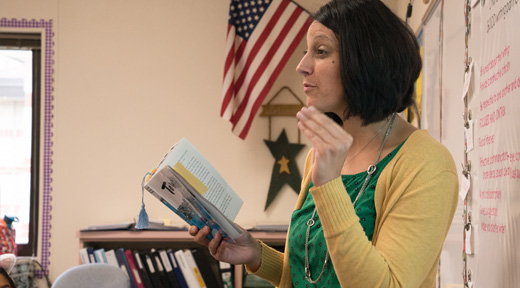Heinemann Units of Study Reading Middle School
Units of Study in Reading
A Workshop Curriculum for Eye School Grades
What Do Our Middle-Class Readers Need?
Nosotros want our middle grades students to become flexible, resilient readers who read for pleasure as well as for academic purposes. We want them to accept a toolkit of strategies for dealing with difficulty, and we desire them to know when and how to use those strategies.
How Can We Best Run across Those Needs?
To achieve such aggressive goals, we must reconsider how we think virtually our classrooms and our curriculum. We can no longer conceive of the curriculum as a few books kids will master. We now recognize the value and importance of teaching a repertoire of skills and strategies to assistance students be more powerful in any book.
Why is the Reading Workshop Then Constructive?
The simplicity and predictability of the workshop frees the teacher from constant choreographing and then that he or she has time to observe, to mind, to assess, and to teach into specific student needs. For the bulk of time during each day, students read, and as they do, they draw upon an ever-growing repertoire of skills, tools, strategies, and habits.
One Proffer for Sequencing Units Across Grade Levels
Grade six:
- A Deep Study of Character
- Tapping the Power of Nonfiction
- Social Issues Volume Clubs
Grade 7:
- Investigating Characterization: Author Studies
- Essential Research Skills for Teens
- Historical Fiction Book Clubs
Course 8:
- Dystopian Volume Clubs
- Literary Nonfiction
- Critical Literacy: Unlocking Contemporary Fiction
Class 9:
- Critical Literacy: Unlocking Gimmicky Fiction
- Essential Research Skills for Teens
- A Book Gild Unit of Choice
In order to provide the greatest flexibility for middle schoolhouse classrooms, the Units and the Guide are all sold separately. You may cull a different sequence based on your school'due south curricular needs, but also keep in mind that at that place is a layering of complexity across the units that you lot will want to consider as yous program.
Note: publication of the previously-appear Poesy unit has been postponed indefinitely.

Units of Study
There are 9 individual units for middle school reading, each available for split up buy. Each unit includes all the instruction points, minilessons, conferences, and small group work needed for the reading workshop.

A Guide to the Reading Workshop
Details the architecture of the minilessons, conferences and small-group strategy sessions, and articulates the management techniques needed to support an effective center school reading workshop. (Bachelor separately for administrators and coaches)

Online Resources
Each unit includes downloadable, printable files for ballast charts (English and Spanish versions) and other charts, read-aloud texts, samples of student work, bands of text complexity, links to videos, tools for learning, and homework assignments.
Frequently Asked Questions (FAQs)
An Introduction to the Middle School Reading Units
- Getting Started with Center School Reading Units Webinar
Reading Workshop in the Heart Grades
- Why teach reading in heart school? (3:24) Mary Ehrenworth /Transcript PDF
- Why teach reading workshop? (3:26) Mary Ehrenworth /Transcript PDF
- What does the workshop framework wait like? (nine:49) Mary Ehrenworth /Transcript PDF
- What are some of the ways the units back up powerful reading educational activity? (8:46) Mary Ehrenworth /Transcript PDF
- Why practice the eye schoolhouse units characteristic read-alouds? (iii:03) Katie Clements /Transcript PDF
Enquiry Base
- What are the conditions needed for readers to thrive? (7:34) Mary Ehrenworth /Transcript PDF
- What does research tell us about the importance of diversity and representation? (iii:36) Mary Ehrenworth /Transcript PDF
- What does inquiry say about nonfiction? (3:40) Mary Ehrenworth /Transcript PDF
- How can we use feedback to advance achievement? (ii:03) Mary Ehrenworth /Transcript PDF
Getting Started/Planning
- What advice do you have for teachers every bit they begin planning instruction? (8:24) Mary Ehrenworth /Transcript PDF
- What communication do you have for teachers who are new to reading workshop? (3:11) Katie Clements /Transcript PDF
- How can teachers ready kids who are new to reading workshop? (4:54) Katie Clements /Transcript PDF
- What are some of the means to sequence units across grade levels in this kickoff twelvemonth of their publication? (4:32) Mary Ehrenworth /Transcript PDF
- Why are the heart school units sold separately rather than in grade-level sets? (3:53) Katy Wischow /Transcript PDF
- How tin can teachers make time for both reading and writing? (8:37) Mary Ehrenworth /Transcript PDF
- What should teachers consider when provisioning classroom libraries? Mary Ehrenworth(3:38) /Transcript PDF
- How tin can administrators best support implementation of the units? (4:06) Mary Ehrenworth /Transcript PDF
Diversity and Social Justice
- How do the units support the promotion of social justice in the classroom? (2:44) Mary Ehrenworth /Transcript PDF
English Learners
- How practise the MSRUOS support English learners? (four:28) Mary Ehrenworth /Transcript PDF
Assessment
- How tin you assess your middle grades readers? (4:57) Mary Ehrenworth /Transcript PDF
- How can teachers assess if students are moving up levels of complexity in fiction and nonfiction? (3:48) Audra Robb /Transcript PDF
- How can we employ feedback to accelerate achievement? (2:03) Mary Ehrenworth /Transcript PDF
- What are some things an administrator should look for when evaluating progress? (iii:28) Audra Robb /Transcript PDF
Classroom Videos from TCRWP
Purchasing Options
Guide to the Reading Workshop
Each Unit of measurement with Trade Pack
Buy Recommendation: In club to provide the greatest flexibility for centre school classrooms the units and guide are all sold separately. For a sequencing suggestion, see above. Choose the bundle with the Merchandise Book Pack if your library does not already include the mentor texts referenced in the Unit of measurement.
Each Unit without Trade Pack
Related Book Society Shelves
elliswithaticking.blogspot.com
Source: https://www.unitsofstudy.com/middleschoolreading/










0 Response to "Heinemann Units of Study Reading Middle School"
Post a Comment